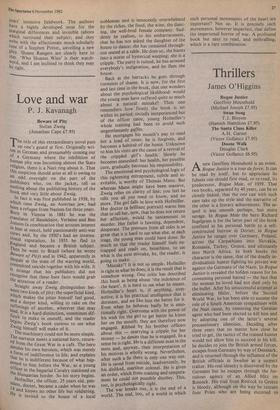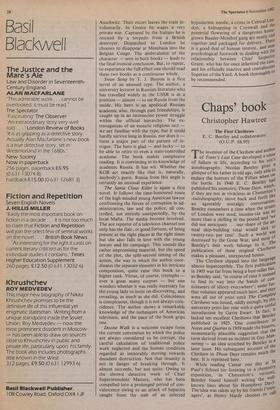Thrillers
James O'Higgins
Anew Geoffrey Household is an event. Rogue Justice is a tour de force. It can be read by itself, but to appreciate its fulness one should first read, or re-read, its predecessor, Rogue Male, of 1939. That two books, separated by 40 years, can be so closely linked, that the one can with such ease take up the style and the narrative of the other is a literary achievement. The se- quel is less smooth perhaps, but more savage. In Rogue Male the hero Richard Ingelgram is for the latter part of the book confined in his personal battle to a self- constructed burrow in Dorset; in Rogue Justice he ranges over Germany, Poland, across the Carpathians into Slovakia, Romania, Turkey, Greece, and ultimately into North Africa. In both books the character is the same, that of the deadly in- dividualistic hunter fighting his private war against the Germany of the Nazis. In Rogue Justice is revealed the hidden reason for his consuming personal hatred — the fact that the woman he loved had not died only by the bullet. After his unsuccessful attempt at eliminating Hitler, before the Second World War, he has been able to assume the role of a South American sympathiser with the Nazi cause, by removing the German agent who had been elected to kill him and by adopting one of the latter's several precautionary identities. Deciding after three years that no matter how close he tried to get, the tactics of the trained hunter would not allow him to succeed in his kill, he decides to join the British armed forces, escapes from Germany by way of Denmark, and is returned through the influence of the British officials in Sweden as a suspect traitor. His real identity is discovered by the Germans but he escapes through the for- tuitous agency of an Allied blitz on Rostock. His trail from Rostock to Greece is bloody, although on the way he rescues four Poles who are being escorted to Auschwitz. Their escort leaves the train in- voluntarily. In Greece he wages a very private war. Captured by the Italians he is rescued by a torpedo from a British destroyer. Dispatched to London he chooses to disappear at Mombasa into the Belgian Congo. The ambivalence of the character — seen in both books — leads to the final ironical conclusion. But, to repeat, to experience the full effect one should read these two books as a continuous whole. Swan Song by T. J. Binyon is a first novel of an unusual type. The author, a university lecturer in Russian literature who has travelled widely in the USSR is in a position — almost — to see Russia from the inside. His hero is an apolitical Russian academic who, through past friendships, is caught up in an internecine power struggle within the official hierarchy. The ex- travaganzas of an esoteric religious sect we are familiar with the type, but it could hardly survive long in Russia, nor does it form a major part of the pattern of in- trigue. The hero is glad — and lucky — to be able to retire to even a state-controlled academe. The book makes complusive reading. It is convincing in its knowledge of academic Russia. It has wit. Whether the KGB act exactly like that is, naturally, anybody's guess. Russia from this angle is certainly an unusual experience. The Santa Claus Killer is again a first novel. It follows the time-honoured route of the high-minded young American lawyer confronting the forces of corruption in ad- ministration, law and the police, all con- trolled, not entirely unexpectedly, by the local Mafia. The media become involved. The ace reporter of a television channel not only has the flair, or good fortune, of being present at the right places at the right times but she also falls in love with the young lawyer and his campaign. This sounds like rather unpromising material, but the speed of the plot, the split-second timing of the action, the way in which the author coor- dinates the separate elements in his intricate composition, quite raise this book to a higher rank. Virtue, of course, triumphs over a great many corpses — but one wonders whether it was really necessary for the young lady to insist on discovering, and revealing, as much as she did. Coincidence is conspicuous, though it is not always coin- cidence. The author shows a remarkable knowledge of the techniques of American television, and the pace of the book grips one. Doone Walk is a welcome escape from the current convention by which the police are always considered to be corrupt, the careful calculation of traditional police work neglected and the human condition regarded as inexorably moving towards decadent destruction. Not that insanity is not in danger of breaking through. It almost succeeds, but not quite. Owing to the shrewd detective work of Chief Superintendent Masters, who has been compelled into a prolonged period of con- valescence owing to an attack of hepatitis caught from the stab of an infected hypodermic needle, a crime in Central Lon- don, a kidnapping in Cornwall and the potential flowering of a dangerous home- grown Baader-Meinhof gang are neatly tied together and packaged for delivery. There is a good deal of human interest, and neat dealing with the
psychological footwork in deal
relationship between Chief Inspector Green, who has for once inherited the case, and his officially inactive and convalescent Superior of the Yard. A book thoroughlY to be recommended.















































 Previous page
Previous page